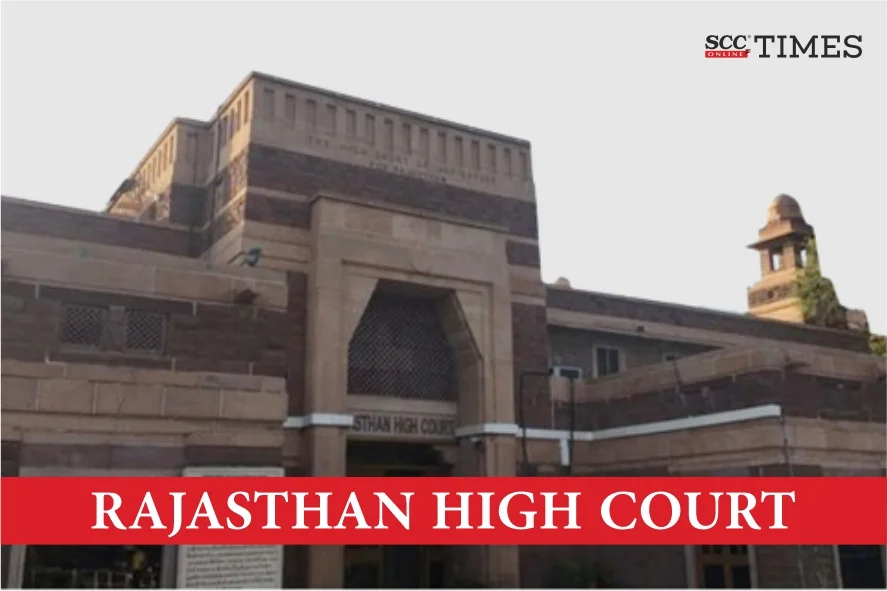Rajasthan High Court: In a writ petition filed by the convict-petitioner, who was convicted for the offence under Section 376(2)(f) of the Penal Code, 1860 (‘IPC’) and Sections 3 and 4 of the Protection of Children from Sexual Offences Act, 2012 (‘POCSO Act’), the Division Bench of Dinesh Mehta and Rajendra Prakash Soni, JJ., opined that if the victim was faced with the presence of the petitioner, it would have an adverse impact on her well-being and she would be forced to re-visit the trauma and reminded of the incident which she would be trying hard to forget. The Court opined that a balance had to be struck between the safety and emotional aspect of the victim and statutory rights of the accused, and such balance would be achieved if the petitioner spent his time of parole at a place which way away from victim’s residence. Thus, the Court quashed and set aside the impugned order dated 10-10-2023 and allowed the petitioner’s application for second parole.
Background
The petitioner applied for his release on second parole under the Rajasthan Prisoners Release on Parole Rules, 1958. However, the District Parole Advisory Committee, Deedwana-Kuchaman rejected the application vide order dated 10-10-2023, and the District Magistrate, Deedwana-Kuchaman informed the petitioner’s wife about the rejection of parole application vide letter dated 13-01-2024. Thus, against this rejection letter, the petitioner filed the present writ petition.
The respondents contended that the petitioner was serving life sentence pursuant to his conviction under Section 376)(f) of the IPC and Sections 3 and 4 of the POCSO Act, and since he had committed grave offence of sexual assault on minor girl, he should not be released on parole. It was stated that releasing the petitioner on parole would have adverse bearings on the social and psychological well-being of the victim, whose residence was adjacent to the petitioner’s house. However, the petitioner submitted that the petitioner would spend his time of parole at his in-laws’ place in Narayanpura village, which was sufficiently away from the victim’s place of residence.
Analysis, Law, and Decision
The Court opined that it was mindful of the legislative intent of the POCSO Act which provided that the contact between the victim and the convict should be prevented to minimize the trauma experienced by the child. Further, the Court opined that if the victim was faced with the presence of the petitioner, it would have an adverse impact on her well-being, and she would be forced to re-visit the trauma and reminded of the incident which she would be trying hard to forget.
The Court opined that a balance had to be struck between the safety and emotional aspect of the victim and statutory rights of the accused, and such balance would be achieved if the petitioner spent his time of parole at a place which way away from victim’s residence. Thus, the Court quashed and set aside the impugned order dated 10-10-2023 and allowed the petitioner’s application for second parole.
Accordingly, the Court ordered that the petitioner should be released on parole of thirty days upon his furnishing a personal bond of Rs. 50,000 with two sureties of Rs. 25,000 each to the satisfaction of Superintendent Central, Jail, Ajmer on the usual terms and conditions. The Court also ordered that the petitioner should spend his period of parole in Naryanpura village and should not visit the village where the victim resided. The Superintendent, Central Jail, Ajmer should be at liberty to impose other reasonable conditions to ensure the petitioner’s return to custody after availing parole, and the parole’s term should be computed from the date of his actual release. The Court further stated that the petitioner would be required to mark his presence on every third day, in the concerned police station where he was spending his time on parole and should surrender himself before the concerned jail authority immediately on expiry of the parole.
[Moti Ram v. State of Rajasthan, 2024 SCC OnLine Raj 479, Order dated 28-02-2024]
Advocates who appeared in this case :
For the Petitioner: Kalu Ram Bhati, Advocate
For the Respondents: Anil Joshi, GA-cum-AAG assisted by Rajat Chhaparwal, Advocate








